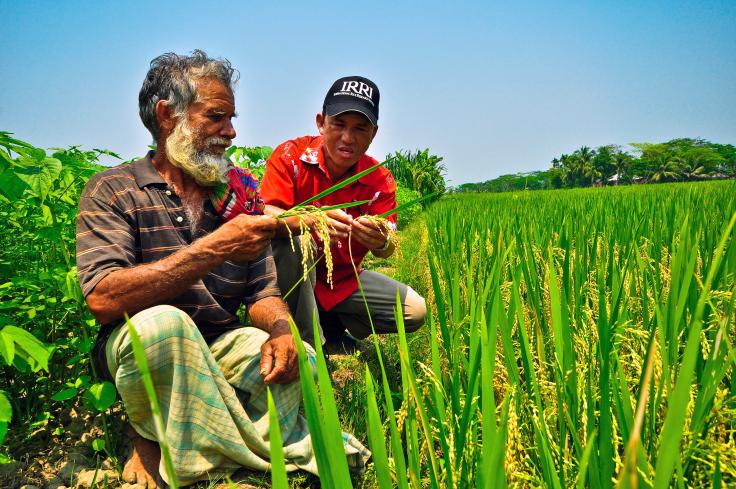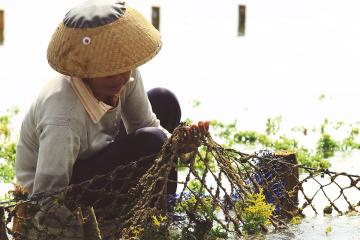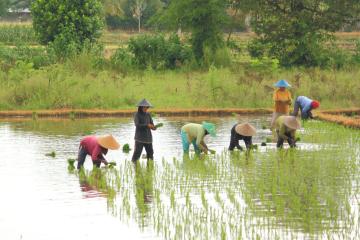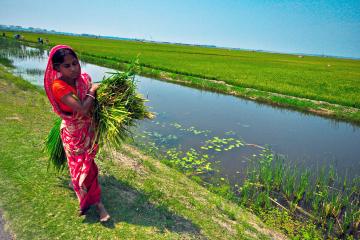
Flood-tolerant seeds help farmers adapt to extreme weather without sacrificing their yields, making investing in change worthwhile.
Donors should invest in developing stress-tolerant crops to strengthen farmers’ resilience to extreme weather. In India, a flood-tolerant rice seed protects farmers’ yields during heavy rains, producing as much rice as traditional seed varieties under normal weather conditions. Marginalized groups benefit the most because they tend to farm land prone to flooding.

Ministries of agriculture in countries where weather is becoming more unpredictable should provide hands-on training and practical information about new seeds’ benefits to increase use. When farmers understand how stress-tolerant seeds work, what changes they need to make for the seeds to flourish, and the potential payoff, they are more likely to use them and boost their yields.
Partnering with private sector suppliers can increase adoption. When informed about the benefits of improved varieties, private seed suppliers are more likely to stock the seeds, and more farmers will buy them.
Increasingly frequent and intense flooding can destroy farmers’ crops and make them hesitant to make risky, yet productive investments in their farms. Farmers may hold back on investing in things like fertilizer for fear their crops might be wiped out, missing out on the chance to grow more food and earn higher profits.
Swarna-Sub1, a flood-tolerant rice seed, is a groundbreaking technology that helps farmers in India cope. Swarna-Sub1, a rice variety developed in part by the International Rice Research Institute (IRRI), is a modified version of locally-prolific Swarna rice in Odisha, India. The seeds produce rice that can withstand flooding for up to fourteen days, compared to three to four days for traditional varieties. It produces the same yields in flood years as regular Swarna rice in non-flood years, meaning farmers don’t have to sacrifice productivity for flood tolerance.
Programs that help farmers learn about the benefits of improved seeds increases their use. Getting improved varieties into the hands of rural farmers, and encouraging trust and adoption of these new technologies, is not easy. Providing information on the benefits of improved varieties through strategies like giving mini kits to farmers to trial the seeds, hands-on training for farmers through field days, and educating suppliers are effective strategies to encourage use.
Partnering with private sector suppliers increases availability of improved varieties and further encourages adoption. Informing private suppliers about the benefits of Swarna-Sub1 incentivized them to keep the seed in stock and encourage potential customers to purchase the seeds. As a result, more farmers bought and used the seeds, particularly those living in areas most exposed to floods.
Farmers who planted improved seeds invested more in their farms and saw increased yields and profits. Farmers who used Swarna-Sub1 took more risks by cultivating more land, using fertilizer, and improving their farming methods. These actions boosted farmers’ rice yields by 10 percent in years when farmers did not experience floods, and stabilized yields when fields did flood. Farmers belonging to more socially- and economically-marginalized groups benefited the most from adopting Swarna-Sub1, as their fields tended to be in the most flood-prone areas.

“There is a huge difference between the optimization that scientists can do and what farmers can do. Farmers don’t farm the way scientists farm. We really need to test the variety as it would be cultivated by the farmers given their constraints.”
—Elisabeth Sadoulet, UC Berkeley
Cost and design considerations
Programs that include design features like hands-on training and practical information about new technologies, like flood-tolerant seeds, increase their use. Offering farmers mini kits containing information on Swarna-Sub1 and a bag of seeds led more farmers to plant the seeds. Field days, which provide in-field training for farmers to directly observe planting techniques and crop performance, increased farmers’ understanding of the costs and benefits of the new seed. Field days were more effective than relying on farmers to share learnings organically within their communities because local social structures limited farmers’ interactions. Local contexts should be carefully considered when designing educational approaches.
Training farmers can improve the cost-effectiveness of new technologies. Farmers’ profits in a single growing season outweighed the costs of holding field days. However, programs that generate farmer demand are usually only cost-effective when seeds are readily available for farmers to purchase; involving local suppliers is also crucial.
Training farmers can improve the cost-effectiveness of new technologies.
Implementing partners and the role of LMIC government
Implementers bring deep local knowledge, technical expertise, and a commitment to evaluation and learning as they bring these programs to life. This includes the following collaborator; this list is not exhaustive.

State and local governments’ commitment to research partnerships have shed light on effective strategies to distribute Swarna-Sub1 to farmers. State and local governments in India were integral players in partnering with researchers and IRRI to test different strategies to increase the distribution and use of the seeds, described above. The Government of West Bengal and Precision Development (PxD) collaborated to incorporate learnings about the adoption of Swarna-Sub1—informing input suppliers and incorporating farmer field days—as the West Bengal government looks to support two million rice farmers in flood-prone areas of West Bengal.
The role of foreign assistance and philanthropy
Foreign assistance and philanthropy played a catalytic role in the R&D of Swarna-Sub1. Since the early 2000s, the Gates Foundation, Germany’s Federal Ministry for Economic Cooperation and Development, Japan’s Ministry of Foreign Affairs, UK International Development, and others have supported direct research and centers like IRRI, a member of the Consultative Group on International Agriculture Research (CGIAR), to develop improved seed varieties that respond to challenges farmers face in a changing climate. STRASA, funded by the Gates Foundation, produced over one million tons of improved seeds and distributed these to over 35 million farmers in India, Nepal, and Bangladesh and in over eighteen countries in sub-Saharan Africa. In 2023, UK International Development launched the UK-CGIAR Centre for Collaboration and Innovation in Science and Technology to further drive research on flood-tolerant rice, among other improved seed varieties like disease-resistant wheat.
Governments and philanthropy have collaborated to enable rigorous evaluation on practical methods for distribution and adoption. UK International Development and the Gates Foundation supported a decade of rigorous research to test strategies like information sharing, hands-on training like field days, and engaging private suppliers to encourage farmers to adopt improved seeds. All of these strategies increased farmers’ use of Swarna-Sub1, enabling them to become more resilient, stabilize their incomes, and plan for the future.
Discover more from J-PAL
Discover more from other sources
Why Farmers and Scientists Farm Differently: A Q&A with Kyle Emerick and Betty Sadoulet
Center for Effective Global Action
Smallholder led Agricultural Transformation Summit
Gates Foundation
Thank you, STRASA
STRASA legacy site; International Rice Research Institute
Photos:
(1) Credit: Shutterstock.com
(2) Credit: IRRI, CC BY-NC-ND-2.0


